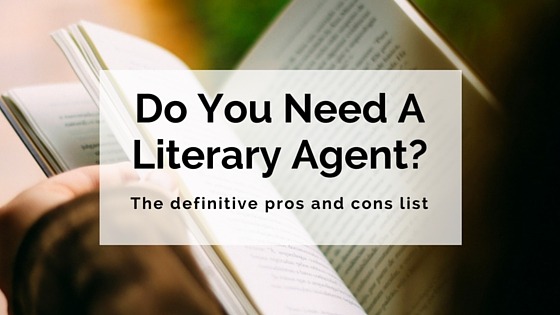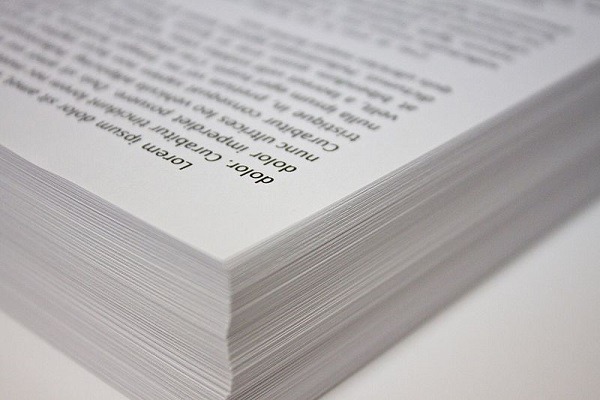So you’ve finished working on your novel, and it’s actually looking pretty good. So good, in fact, that you think it’s ready to be sent out into the world.
Upon reaching this stage, more and more authors these days are choosing the option of self-publishing. But if you’re choosing to take the traditional publishing route, the journey from original manuscript to published book can be long and somewhat difficult to navigate.
Authors seeking traditional publication undergo a lengthy procedure that involves identifying appropriate publishers, querying, pitching, contract negotiation…
For a new writer especially, this list gets more and more intimidating as it goes on. It’s scary trying to navigate the competitive, unfamiliar territory of the publishing world on your own – not to mention exhausting and, at times, disheartening.
That’s where literary agents come in.

A literary agent can be an author’s key to the publishing world. But take note of the key phrase there: can be, not is. In today’s ever-evolving literary landscape, there are plenty of different ways to get your work out there. So does every writer seeking publication need a literary agent?
You might automatically think the answer is yes, especially if you’re looking at being published traditionally, but it’s not necessarily so black-and-white. It all depends on the individual author and the type of work they’re trying to have published.
In light of this uncertainty, we’ve put together a comprehensive list of the pros and cons of literary agents to help you decide whether agency representation is something you personally need.
Looking at both the positive and negative sides of the story, we’re aiming to give you a balanced insight into this complicated part of the publishing process.

PROS of Having a Literary Agent
Easier submissions process
Let’s start at the very beginning. In order for your book to be considered by traditional publishers, you’ll need to have a completed manuscript (or a well-thought-out pitch, if you’re a non-fiction writer – but more about that later).
Once you’ve got this ready to go, there are two paths you can take. One is to send out unsolicited submissions – that is, undertake the submissions process entirely yourself. The other is to pitch your book to literary agents first, with a view to eventually hiring an agent to submit to publishers on your behalf.
There are upsides and downsides to both these options. It’s true that by choosing to take the literary agent route, you’ll effectively be doubling up on your submissions process by first having to submit to agents, then to publishers.
But while this prospect most likely won’t appeal to most authors, who are excited and impatient to get their work out there as quickly as possible, it’s worth taking a moment to consider the benefits of exercising a little patience.
By taking the extra step of submitting to agents first, you’ll gain an extra opportunity to refine and perfect your manuscript as thoroughly as possible. An agent’s job is to ensure your novel is completely ready to hit publishers’ desks before it goes out into the world; remember, they know what publishers want, and they know how to pitch it to them.
It may take a little longer, but once you’ve gone through the process of submitting to and securing an agent, then working with them to refine your manuscript, submitting to publishers will be a whole lot easier.

As well as the advantage of their industry know-how, which we’ll discuss further below, another great benefit of having an agent is that they’re able to send out simultaneous submissions. As an author fending for yourself, this isn’t something publishers will often accept.
This is basic publishing industry etiquette. A publisher wants to be sure the manuscript you’ve sent them is worth their time and consideration, especially if it’s unsolicited. This precludes it being under consideration from other publishers. If the manuscript is good, one publisher may make an offer before another gets a chance – in which case, the latter’s time will have been wasted.
However, the story is a little different when agents are involved. It’s pretty much standard practice for agents to submit to more than one publisher at a time, especially if they think the manuscript has great commercial potential or suits a wide range of audiences.
Multiple submissions may even ignite a bidding war, in which publishers compete for representation of a highly sought-after manuscript. In this case, an agent will use their knowledge and skills to negotiate the best possible deal for you and your book.
This, of course, is a very-best-case scenario, especially for a new author; but even if things don’t escalate to this stage, simultaneous submissions from an agent give your manuscript a better chance at finding a home.

Competitive edge
As we all know, the publishing world is highly competitive. For this reason, having an agent can give you an advantage you might not otherwise have over the myriad other emerging authors attempting to get noticed and published.
For one thing, an agent-submitted manuscript comes with a certain automatic stamp of quality.
Whereas unsolicited manuscripts could be anything from a masterpiece (rare) to the scribblings of a hobbyist (common), publishers can be certain that a manuscript put forward by an agent (especially an agent who has a good reputation or a standing relationship with a particular publisher) is well-written and worth looking at.
This gives authors with agents an automatic advantage, in that their manuscript is simply less likely to be lost amongst publishers’ towering slush piles.
Furthermore, many publishers are so large and/or so inundated with manuscripts nowadays that they won’t even look at submissions that don’t come from agents. So if you’re ambitious and confident in your manuscript, and therefore determined to tackle the biggest and best publishing houses, your best option is to hire an agent.
Industry expertise
Like most professional industries, publishing is a complicated area of business. The ins and outs of the publishing process can be intimidating, confusing and overwhelming, especially for new writers.
Even if you’ve worked out the submissions process and managed to land a publisher on your own, there’s a whole world beyond the acceptance of a manuscript that many authors know little about. Luckily, this is the very world in which literary agents feel most comfortable!
Contracts, advances and royalties, author rights – these are all important components of the publishing process, but they may seem rather foreign and intimidating to new authors.
Yes, you can (and probably should) research these things yourself to gain a basic understanding of the legal and technical side of publishing. But when it comes down to it, you still won’t have the in-depth knowledge and hands-on experience a literary agent can provide.
Through their training, experience and often long-running careers in the business, agents offer a level of industry expertise that’s an indispensable benefit for first-time authors. An agent’s knowledge will help you protect yourself as a writer and ensure your book gets the best deal possible.

Contacts and connections
A literary agent is essentially a ‘people person’. Connection is the name of their game: they put the right people in touch with each other, the right books in the hands of the right publishers. Agents are that foot in the door, that number in the contacts list, that favour to be called in.
In addition to their wide-ranging network of contacts within the industry, literary agents also know which editor or publisher is best for which book.
An agent won’t waste time, for example, pitching your fantasy manuscript to an editor whom they know is more interested in science fiction. They also won’t send your book out at random to any publisher that comes to mind.
Instead, an agent will use their contacts, connections and insider knowledge to develop a carefully thought-out plan of attack. They’ll target the publishers who are most likely to respond to your particular manuscript, and/or with whom they have an established connection.
That old saying, ‘It’s not what you know, it’s who you know’, comes to mind here. For authors who may have a brilliant manuscript but no industry contacts or connections to speak of, a literary agent may be your best bet.
Having someone who’s always on your side
This is a simple yet very important advantage of having a literary agent. Put plainly, an agent’s job is to be on their author’s side at all times. They’re there to fight for you, your work and your rights; to remain in your corner of the ring at all times in this difficult, competitive industry.
Agents can also provide the motivation and encouragement necessary to keep going as a writer. It can be a scary and discouraging business, reaching out to publishers and having to handle rejection all on your own.
A literary agent can keep your positivity and spirits up – their unwavering determination to get you published will be contagious.

CONS of Having a Literary Agent
Risks involved
There are a number of risks associated with hiring a literary agent for your book. First and foremost, there’s the risk that the agent you’ve hired might be – for want of a better word – dodgy.
It’s a sad truth of today’s world that people often take advantage of those new to a profession, and unfortunately, writers are highly likely to be in danger of falling prey to such people.
Scams and dishonest dealings can be particularly rife within the publishing landscape, especially when it comes to literary agents. For this reason, authors need to be informed and aware of certain things before they begin their search for an agent.
Authors new to the industry, for example, may assume that the process of hiring an agent involves a fee other than the commission they make on the work.
While this is a reasonable assumption, and while that’s the way things may have been in the past, the truth is that any agent who asks you for a ‘reading fee’ or any other such upfront cost is probably hoping to take advantage of your lack of knowledge.
As this great article about literary agents’ fees points out, there are many different pretences and guises under which an agent may ask for payment. But the bottom line, summed up by another handy article about fees, is this:
Industry standard practice is that literary agents are paid for their work through the commission they make when they sell your book and not by directly charging the author(s) they represent.” – Writer’s Relief
Inappropriate fee-charging is just one of the ways authors can fall prey to a less-than-reputable agent. So with all that potential for swindling out there, how can you negate the risk of being taken for a ride?
Well, there’s really only one way: you must do your research.

Australian authors should begin by referring to a resource such as the Australian Literary Agents’ Association, whose Members section lists literary agencies, contacts and important information. UK writers should refer to the Association of Authors’ Agents, and US writers to the Association of Authors’ Representatives.
Apart from these official organisations, there are plenty of other helpful resources to assist writers in the process of finding an agent.
Author Victoria Strauss has put together a helpful article about the safest way to search for an agent; she’s also the founder of a very useful website, Writer Beware, which aims to ‘track, expose, and raise awareness of the prevalence of fraud and other questionable activities in and around the publishing industry’.
The Australian Society of Authors also provides a sample agreement between a literary agent and an author, giving writers an idea of what such an agreement should cover and what it all means.
One final important thing to remember while we’re talking risks is that publication is not guaranteed just because you have an agent. Even though there should be no upfront costs involved, you’re still dedicating a large amount of time, hope and energy into the process of securing and utilising an agent.
Be sure it’s the right path for you before you set out on it, because it’s not an automatic guarantor of publication and success.

Costs involved
After touching briefly above on the issue of money and fees, let’s take a look at the actual costs involved in agency representation.
Generally speaking, literary agents will take a commission of 15% of your earnings for a book. This means 15% of your advance and of any royalties you receive after publication.
It also includes things such as ebook, film and audiobook rights. (The rate increases with developments such as foreign rights sales and translations – agents tend to receive around 20% commission on these earnings.)
While 15% may not really seem like a lot on paper, in practice it can really add up. Keep in mind that traditionally published authors typically only earn around 8–10% of the overall profits of a book. When you factor in an agent’s 15% on top of this, the amount you can expect to earn from book sales is (sadly) less than you might think.
It’s also worth remembering that your agent will continue receiving their commission indefinitely – that is, for as long as your book and any derivative works are in circulation.
If you’re wary about where your earnings are going or you’re determined to keep 100% of the profits for yourself, the commission factor is a definite downside to having an agent.
Waiting time
Ahh, the waiting game… A game writers know all too well.
Things move slowly at the best of times in publishing, but the period between finishing your book and seeing it published can be even longer when you’re working with a literary agent.
As we discussed above, the submissions process is effectively doubled when you choose to seek out an agent. You’re selling your book twice: first to the agent, then to the publisher through the agent. All this takes time.
Of course, you need to weigh the timeframe against the likelihood that you can snag a traditional publisher without the help of an agent. There’s no point rushing into things and skipping the agent step if you’re not actually going to get anywhere without one.
However, in today’s publishing landscape it’s more possible than ever for writers to be published without an agent. So, once again, have a think about the type of book you’ve written and the type of audience you want it to reach, then weigh up for yourself whether you have the need (and the patience) to seek publication via an agent.

Some styles/genres are harder to represent
As we mentioned at the beginning of this article, literary agents may not be for everyone. The publishing process undertaken by each author is unique: just as no two books are the same, no two publishing routes follow the same prescribed path.
This is especially true when it comes to different genres and styles of writing. For instance, it’s sometimes more difficult to secure an agent for literary fiction as opposed to commercial fiction.
There are a few reasons for this – the most obvious being that the market for literary fiction obviously isn’t as big as the market for commercial fiction. An agent, after all, is a seller: they have to sell a book to a publisher by showing how it will sell to an audience.
This isn’t to say that there are no agents for authors of literary fiction; there are actually plenty, as any perusal of a reputable agent index will tell you.
However, if you write in this style, it’s probably going to be a little harder to secure an agent, as they’ll want to make doubly sure your work is worth their time and effort if it’s not a clear commercial bestseller.
Agents are an even more negotiable aspect for writers in genres and styles such as non-fiction, children’s literature, poetry and short stories. Authors of these types of works don’t necessarily benefit from agency representation the same way authors of novels tend to do.
If you’re a non-fiction writer, for instance – especially one who writes about a niche subject area – it may be easier to approach publishers directly, rather than seeking an agent as an intermediary. In fact, unless your non-fiction book has big commercial potential, it’s unlikely to be taken on by an agent.
Luckily, it can be a little easier to feel out the market for non-fiction yourself, in order to determine if and where your book might eventually find a home.
Unlike fiction, where an author must have a completed manuscript before pitching, non-fiction writers are able to pitch a book proposal instead, even if the bulk of their writing hasn’t yet been completed. As Jane Friedman points out, ‘If you write non-fiction, the marketability of your idea and your platform often matter as much as the writing, if not more so.’
With the right research, pitching a book proposal is something authors are often able to do successfully without an agent.

Fiction writers seeking to publish a novella or collection of short stories, rather than a full-length novel, won’t necessarily benefit from pitching to agents, either.
Short fiction is something of a niche market, and again, the agent’s job comes down to selling: nine times out of ten, the average customer will buy a novel over a collection of short stories – especially by a relatively unknown author.
US literary agent Robin Mizell rightly points out that publishers are always looking for the most ‘commercially viable creative output’ – and subsequently, so are agents. This output usually takes the form of a novel.
If you’re determined to publish your short stories, however, perhaps consider small press or self-publishing, two options that lend themselves better to the short form and that don’t require an agent.
It’s a bit of a similar story when it comes to poets. To publish a collection of poems, they can’t simply pitch to and hire an agent, because there are virtually no reputable agents who will represent poets.
In fact, both Writer’s Relief and Victoria Strauss of Writer Beware make cases against poets seeking agency representation. Both articles suggest that, rather than wasting time seeking an agent for their poetry, poets are much better off pitching to small presses or taking the self-publishing route, as we suggested above for authors of short stories.
All of the above reinforces the most important thing authors should keep in mind about agency representation: when you’re deciding whether you need a literary agent, you need to consider what’s best for the work itself.
***
We know all this is lot to think about! There’s a huge mix of both benefits and downsides to agency representation. But once you’ve considered the pros and cons of literary agents and the way it all relates to your individual story, you’ll have a better idea of how to go about seeking publication for your work.
Whichever path you choose to take, we wish you all the best for your publishing journey!
4 responses to “Do You Need a Literary Agent? The Definitive Pros and Cons List”
Dear Claire,
Thank you for a very informative article. It has assisted in whether I should bother to find an agent but the stress of waiting for an answer can be overwhelming. I have written two novels and two non-fiction books that are bonsai related and are self-published. The biggest hurdled for me is the cost of advertising and have resigned myself to just do what I can afford, and have come to a belief that I will never make a fortune from my writing. I am retired and write every day and currently completing work on updating the bonsai related books and then back to the next novel, and then on to the other 10 ideas I have. Well, it keeps me off the streets. Thanks again for the information.
Angelo
This is a good article, but I think is missing something about the numbers game of finding a literary agent in Australia – you make it sound like more of an option than what I see is the case.
At the time I’m writing this in early 2019, there are 15 agents listed on the Australian Literary Agents’ Association. I managed to find a few others by Googling, making a total of 24, though I brought that back down to 20 for my list right away as some of the extras didn’t look very professional.
Of the 20 left, 11 are currently, indefinitely, closed to submissions, though 2 of those are accepting through word of mouth or pitching at events. In the closed group by the way are a few agencies who also represent other creatives like actors and have images of semi-famous people on their websites … possibly not too interested in unknown first-time novelists.
That leaves 9 agents to query directly. Of those, there are bound to be some who won’t be interested in your genre or just your novel’s premise even if the right genre, or are looking for particular things at that moment in time you make contact, and won’t read past your pitch even if it’s fundamentally okay.
You could say that the diamonds always get through somehow and one of those 9 agents will want your manuscript if you have a really good one. But from what I’ve been reading about submission, you could also say that 9 rejections would not really be all that many. And not a large enough sample size to help you determine whether or not your novel is publishable or needs to be drawered, because of the varying reasons (if any) for rejection you’re likely to get.
So no choice but to move on to the publishers’ slush piles even if you’d like an agent.
The article also doesn’t mention that you can approach agents with publishing contract in hand – either for representation or for advice on the contract, which they provide for a once-off fee. I guess this is too late if you were hoping to orchestrate a bidding war among several publishers but at least is a second opinion on the contract.
Finally, I believe not all agents accept multiple submissions either (the article only mentions that publishers don’t), even while they tell you they could take up to a number of months assessing your work. This is extremely frustrating no matter how patient a person you might be.
Thank you for taking the time to inform us about the pros and cons on this subject. I have written two novels and I’m currently on my third. The first two were not as profitable as I had hoped, but still fun to do. As I hone my craft, I believe that an agent will be my best bet in the future. Thanks to you, I’m now aware of what to look for.
Yours Truly,
Matthew